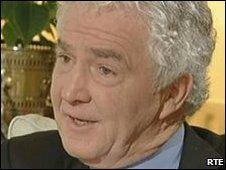Sean Fitzpatrick, former Anglo-Irish head, bankrupt
- Published

Sean Fitzpatrick is the former chief executive of the Anglo-Irish Bank
The former head of Anglo-Irish Bank Sean Fitzpatrick has been declared bankrupt by the High Court in Dublin.
His lawyers said that he was "bowing to the inevitable" after failing to reach agreement with creditors, including his former employer.
Mr Fitzpatrick owes 110m euros after a series of investments in Anglo-Irish shares, which became worthless following its nationalisation.
It is understoood his assets are worth 70m euros less than his liabilities.
Under the Irish system, somebody who cannot fully repay remains bankrupt for 12 years compared to as little as one year in the UK.
Such an individual must hand over assets to a court-appointed official who can sell them to reimburse creditors.
The official can also apply to the courts to appropriate some of the pension or income of a bankrupt person.
'Success story'
Mr Fitzpatrick built Anglo-Irish to become what appeared to be one of the biggest success stories of the Irish Republic's boom years.
However its business model, which involved lending huge sums to a small number of property investors, was exposed as fatally flawed by a collapse in property prices, caused by the credit crunch.
The bank was nationalised in 2009 and has so far cost the Irish taxpayer 22bn euros.
Mr Fitzpatrick was forced to step down from the chairman's role a month before nationalisation.
He left in disgrace after admitting hiding from the bank's shareholders 87m euros of personal borrowings he had taken from Anglo between 2000 and 2007.
He hid the loans from public view by moving borrowings to another bank before the end of the financial year.
Mr Fitzpatrick has been cast as one of the villains of Ireland's economic crisis.
In October 2008, at a time when the Irish government had committed itself to a huge guarantee for the Irish banking system, Mr Fitzpatrick gave a radio interview in which he refused to apologise for his bank's role in the crisis.
He later called for the government to consider tackling the "the sacred cows" of universal child benefit and state pensions.
Mr Fitzpatrick was also a critic of what he believed was excessive regulation of Irish banks.
A recent official report into the roots of the Irish banking crisis found that part of the problem was that regulation was so lax.
It described the approach taken by the Central Bank and the regulator to the banks as "timid", "excessively deferential" and "accommodating".
- Published9 July 2010